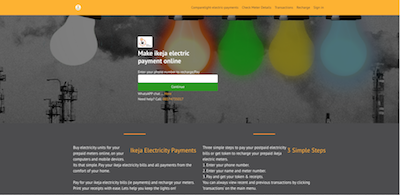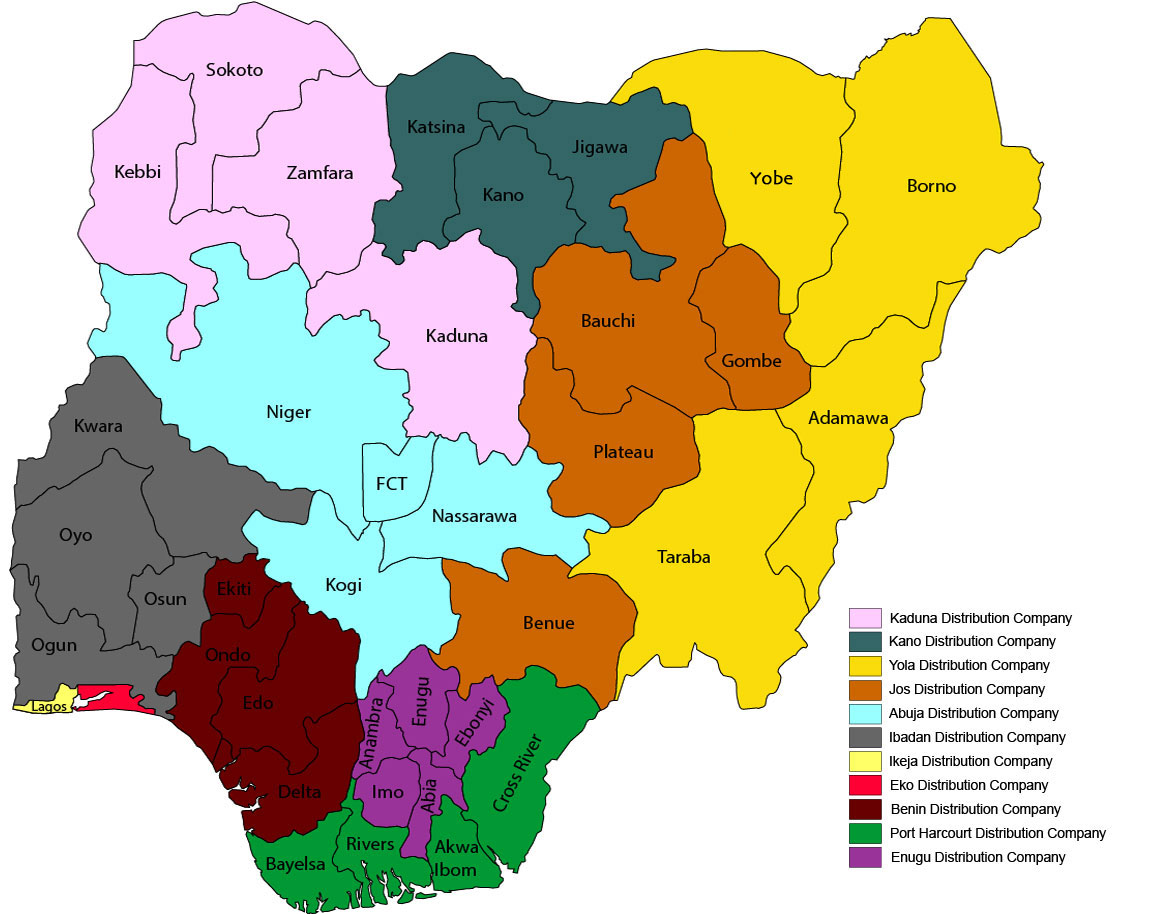Buying Electricity Online
we had NEPA and PHCN, most electricity consumers walk into banks to pay Nepa bills and PHCN bills. The NEPA officials read meters manually in other to calculate energy consumptions by consumers and a bill is generated. This type of payment is described as postpaid. A situation whereby consumers make payment on a monthly basis after consuming a certain amount of electricity. NEPA became PHCN and consumers were issued prepaid meters and it came with smart cards. Consumers were requested to take the smart card readers to PHCN business units for loading. Once a consumer loads his or her smart card with electricity depending on the amount they intend to recharge, the meter is then inserted into the meter and electricity is restored. But now, we have quite a number of distribution companies There are 11 Electricity Distribution Companies (DisCos) in Nigeria namely;
-
Kaduna Electricity Distribution Plc (KNEDC) with its address at No 1-2 Ahmadu Bello Way, Kaduna, Kaduna State, its Franchise Area includes Kaduna, Kebbi, Sokoto, Zamfara, Website: http://kaedco.com/ Call Centre: 0817-403-5711 and Email: info@kaedco.com.
-
Kano distribution company (KEDC) with its address at 1 Niger Street, P.M.B 3089, Kano State with Franchise Area: Kano, Katsina, Jigawa, Website:http://www.kedco.ng/index.php, Call Centre: 0700-5555-1111 and Email: customercare@kedco.ng.
-
Yola distribution company (YEDC) with its address at No 2 Atiku Abubakar Road, Jimeta-Yola, Adamawa State, Franchise Area: Adamawa, Borno, Taraba & Yobe, Website:http://www.yedc.com.ng and Call Centre: 0903-885-3308, 0903-885-3247.
-
Jos distribution company (JEDC) with its Address at 9 Ahmadu Bello Way, Jos, Plateau State, and its Franchise Area includes Bauchi, Benue, Gombe Plateau, Website: http://www.jedplc.com/, Email: info@jedplc.com and Call Centre: 0706-940-3531.
-
Abuja distribution company(AEDC) with its Address at No. 1 Ziquinchor Street, Off IBB Way, Wuse Zone 4, Abuja and Franchise Area includes FCT, Kogi, Nasarawa & most parts of Niger States, Website: http://www.abujaelectricity.com,Call Centre: 0815-018-1818,0815-019-1919 and Email:info@abujaelectricity.com.
-
Ibadan distribution company (IBEDC) with its Address at Capital Building, 115 Ring Road, Ibadan, Oyo State. and its Franchise Area includes Oyo, Ogun, Osun, Kwara and parts of Niger, Ekiti and Kogi states.Website: http://www.ibedc-ng.com,Call Centre: 0903-900-0065, 0905-369-8850, 0905-369-8851 and Email: customercare@ibedc.com.
-
Ikeja distribution company (IKEDC) with its Address at Secretariat Rd, Alausa-Ikeja, Lagos State and its Franchise Area includes Parts of Lagos States (Abule Egba, Akowonjo, Ikeja, Ikorodu, Oshodi, Shomolu), Website: http://www.ikejaelectric.com,Call Centre: 0700-022-5543, 01-7000-250, 01-448-3900 and Email: customercare@ikejaelectric.com.
-
Eko distribution company (EKEDC) with its Address at 24/25 Marina Street, Lagos Island, Lagos State and Franchise Area includes Southern Lagos State (Ojo, Festac, Ijora, Mushin (also covers Orile areas), Apapa, Lekki (also covers Ibeju areas), Lagos Island (also covers Ajele areas) & part of Ogun State (Agbara), Website: https://ekedp.com, Call Centre: 0708 065 5555 and Email: customercare@ekedp.com.
-
Benin distribution company, Port Harcourt distribution company (PHEDC) with its Address at No 42, Obi Wali Road, Port Harcourt, Rivers State and Franchise Area includes Akwa Ibom, Bayelsa, Cross Rivers, Rivers, Website: http://www.phed.com.ng Email: customercare@phed.com.ng, Call Centre: 0813-983-4000, 0813-983-4001, 0813-983-4002, 0908-783-8800, 0908-783-8801, 0908-783-8802
-
Enugu distribution company (EEDC) with its Address at 1 Okpara Avenue, Enugu, Enugu State, and Franchise Area includes Abia, Anambra, Enugu, Ebonyi, Imo, Website: http://www.enugudisco.com Call Centre: 0812-102-0423 and Email:customerservice@enugudisco.com.
-
Port Harcourt Electricity Distribution Plc (PHEDC) with its Address at No 42, Obi Wali Road, Port Harcourt, Rivers State. and Franchise Area includes Akwa Ibom, Bayelsa, Cross Rivers, Rivers, Website:http://www.phed.com.ng Email: customercare@phed.com.ng and Call Centre: 0813-983-4000, 0813-983-4001, 0813-983-4002, 0908-783-8800, 0908-783-8801, 0908-783-8802
These DisCos now offers smart prepaid meters that allow the consumer to purchase electricity online.
Impact of buying electricity online
Buying electricity online is the quickest way for homes to ensure the supply of electricity when they need it. The idea of walking long distances to purchase power or recharge prepaid meters and pay NEPA and PHCN is no longer necessary. Consumers can visit electricity vendors that exist online and make the necessary electricity purchase. Value is delivered instantly after consumers make payment online and in cases where there are issues due to low internet connectivity users can reach out to the customer service of the electricity vending company. With the online electricity purchase option, consumers can determine the amount of electricity they intend to buy according to their budget or funds available to them.
This system eradicates estimated billing associated with the days of NEPA and PHCN, estimated bills are never accurate and disputable since the consumer has no say in the process of calculating the actual amount of energy consumed. Also, the era whereby consumers are disconnected via the distribution lines when they default in bill payments will no longer be necessary as the smart prepaid meters automatically cuts the consumer off when they run out of electricity credit. This new system has also helped the DISCos to concentrate more on maintenance as against disconnections. Also, the amount of debt owed the DISCOs is reduced significantly as previous outstanding bill settlements are debited on the newly issued prepaid meters. Electricity consumers are now conscious of how they consume energy and smart ways to save energy. The opportunity to recharge or buy electricity round the clock is the main benefit of buying power online.
These post will cover the Reasons why you should buy electricity online, Steps to buying electricity online, important features to consider when buying electricity online and examples of where you can buy electricity online.
Why you should buy electricity online
-
it's easy and faster when you go online to credit your prepaid meters or pay your NEPA and PHCN bills, your token is delivered instantly and your account is credited immediately.
-
You can do it anywhere and from the comfort of your home, you do not need to travel far. So depending on when the need arises you can recharge using your phone or your computers.
-
You can verify your purchase immediately because after you make payment a receipt will be issued to you and you can also input the generated token into your meter for confirmation.
-
You have evidence of payment. Just as indicated above, there is evidence of payment in the form of a receipt which you can make a reference if there is a need to do so.

Steps to buying electricity online
-
Know your Electricity distribution company (Disco) You can find details of your electricity distribution company by checking the details on your bill or by looking at your meter. In most cases, you will have the logo of the company inscribed on the meter. Alternatively, have a look at the Map below that shows an infographic of the coverage areas of the 11 DISCO companies.
-
Consider your preferred payment method; each of the electricity vending platforms has different payment options, such as Debit card, shortcode, QR scan, direct transfers, and bank account. So depending on what you prefer, ensure that your payment preference is available on such a platform.
-
Chose an electricity vending platform; Choose your preferred electricity dealer or marketer and you may want to stick with them especially if they offer the service that allows you to view your previous transactions as you can use this to calculate your weekly or monthly electricity expense.
-
Buy power; Once you are happy! go ahead and make your purchase.

important features to consider when buying electricity online
-
Mobile friendliness; make sure you have selected a website that you can access on your mobile phones as well. comparelight.com is a good example.
-
Meter details verification; Also due to the fact that there are times when your DISCOs will request you to make a minimum payment, your preferred online platform for buying electricity must-have feature that allows you to check your meter details so you know what is outstanding before you recharge.
-
Customer care; Also ensure that your electricity platform has a good customer care service unit. You must be able to reach them by mail, phone and possibly social media like WhatsApp.
-
Refund policies; Sometimes due to bank error as a customer you may not get your recharge token after you make payment, make sure you check the refund policy of the website you intend to use. The best ones will refund your money in less than 24hours. Comparelight.com s a good example.
Examples of where you can buy electricity online
-
comparelight.com
-
Banks
-
Discos
Conclusion
Whenever you run out of electricity the best way to recharge is to buy electricity online It is quicker and more reliable and people that shop online also consider other reasons such people cite most often for shopping online is that they can review and compare dozens of electricity vendor at once. Rather than having to travel from shop to shop, online options simply navigate from one web page to the next comparing the service and the products of those electricity dealers. You can search for reviews of your products, compare price, and customer service — and they can do it all online.
Buying electricity online also offer you better and cheaper pricing compared to buying in shops, It may not be who you are looking for but they are out there. In fact, many shoppers use a hybrid shopping system where they visit a physical store to determine exactly what they want and then search online for better pricing, this is particularly true in electricity vending category
A good understanding of history will also give a good understanding as to how the country arrived at a situation whereby its citizens can buy electricity online.
Brief History
As part of the evolution in the Power Industry in Nigeria, created the National Electric Power Authority (NEPA). This was consequent upon the merger of the Electricity Corporation of Nigeria (ECN) and Niger Dams Authority (NDA). In September 1990, the partial commercialization came into being with the appointment of a Managing Director/Chief Executive to superintend over the Corporation. Also, the Authority was divided into four autonomous divisions namely: Generation and Transmission; Distribution and Sales; Engineering; Finance and Administration. Each division was headed by an Executive Director.
The Federal Government of Nigeria (FGN) took further steps towards the Restructuring of the Nigerian Power Sector to establish an electricity supply that is efficient, reliable and cost-effective throughout the country and which will attract private investment. Subsequently, another Power Sector Reform Act was enacted in 2005, transferring the public monopoly of NEPA to Power Holding Company of Nigeria (PHCN) which was unbundled into 18 Business Units (BU); viz eleven (11) Distribution companies:- six (6) Generation companies and one (1) Transmission company .
The Transmission Company of Nigeria (TCN) is one of the successors of the unbundled PHCN and is currently an asset held under the custodianship of the Federal Ministry of Power. It will initially remain publicly owned. TCN has the responsibility for the management of the operation, maintenance and expansion of the 132kV and 330kV transmission system. The Bureau of Public Enterprise (BPE) recently appointed a Management Contractor, Manitoba Hydro International (MHI) for TCN which took over the functions of Transmission Service Provider, System Operator, and Market Operator to undertake the overall management of TCN.
System Operations (SO) function was established as a sector within the defunct Power Holding Company of Nigeria under the Transmission sector. The SO has now evolved into a semi-autonomous sector under TCN and upon acquiring its license would operate as an independent company in the future. The main responsibility of the System Operator is to operate the transmission system and the connected installed generation in a safe and reliable manner. SO is also responsible for the overall security and reliability of the grid system, economic dispatch of available generation resources and maintaining system stability. SO has seven functional departments namely; Operations/Control, System Planning, SCADA, Communications, Technical Services, Transitional Electricity Market and System Performance. SO is headed by the Executive Director (System Operation). The operational control hierarchy is as follows:
National Control Centre (NCC), Osogbo
Three (3) Regional Control Centres (RCCs) at Shiroro, Ikeja West and Benin. With proposed control centers at Kano, Alaoji, and Gombe
Eight (8) Regional Operations Coordinating units (ROCs) at Benin, Enugu, Port-Harcourt, Bauchi, Kaduna, Shiroro, Osogbo, and Lagos – several Area Control Centres covering 330kV and 132kV substations which fall under the supervision of the ROCs
Electricity generation started in Nigeria in 1896 but the first electric utility company, known as the Nigerian Electricity Supply Company, was established in 1929. By the year 2000, a state-owned monopoly, the National Electric Power Authority (NEPA), was in charge of the generation, transmission and distribution of electric power in Nigeria.
It operated as a vertically integrated utility company and had a total generation capacity of about 6, 200 MW from 2 hydro and 4 thermal power plants. This resulted in an unstable and unreliable electric power supply situation in the country with customers exposed to frequent power cuts and a long period of power outages and an industry characterized by lack of maintenance of power infrastructure, outdated power plants, low revenues, high losses, power theft, and non-cost reflective tariffs.
In the year 2001, the reform of the electricity sector began with the promulgation of the National Electric Power Policy which had as its goal the establishment of an efficient electricity market in Nigeria. It had the overall objective of transferring the ownership and management of the infrastructure and assets of the electricity industry to the private sector with the consequent creation of all the necessary structures required to forming and sustain an electricity market in Nigeria.
In 2005 the Electric Power Sector Reform (EPSR) Act was enacted and the Nigerian Electricity Regulatory Commission (NERC) was established as an independent regulatory body for the electricity industry in Nigeria. In addition, the Power Holding Company of Nigeria (PHCN) was formed as a transitional corporation that comprises of the 18 successor companies (6 generation companies, 11 distribution companies, and 1 transmission company) created from NEPA.
In 2O10, the Nigerian Bulk Electricity Trading Plc (NBET) was established as a credible off-taker of electric power from generation companies. By November 2013, the privatization of all generation and 10 distribution companies was completed with the Federal Government retaining the ownership of the transmission company. The privatization of the 11th distribution company was completed in November 2014.
As seen on nercng.org



